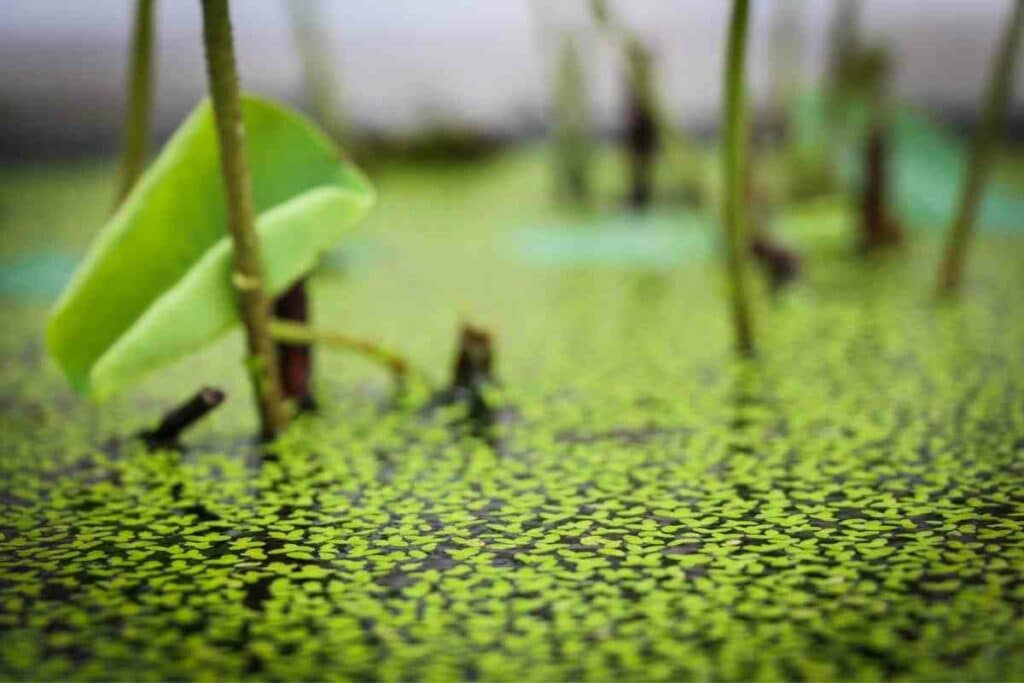Ducks are a common sight in many ponds and lakes, but you may be wondering if they eat duckweed. This aquatic plant can be a nuisance in ponds and lakes, but it is also a food source for ducks.
Duckweed is a tiny, fast-growing aquatic plant that can be found in bodies of water all over the world but is most abundant in North America.
It often grows in dense colonies, and because it’s so small, it can be mistaken for algae.
But duckweed is more than just a nuisance – it’s also a valuable source of food for ducks and other waterfowl.
Do Ducks Eat Duckweed?
Ducks are omnivorous animals and will eat a variety of foods, including duckweed. While most ducks do not eat it as a primary food item the main duck species that will eat duckweed as a secondary food item is the Wood Duck.
Duckweed is eaten by a variety of waterfowl, especially those that feed on the surface, such as mallards, teals, and wood ducks.
Duckweed is a good source of nutrients for ducks and can help them to stay healthy. Ducks will typically eat duckweed that is growing in or near the water, but they may also consume it from the surface of the water.
While duckweed is not essential for ducks, it does provide some nutritional benefits and can be a valuable part of their diet.
Ducks that eat duckweed include:
- Muscovy ducks
- Wood ducks
- Wild ducks
- Teal ducks
- Mallard ducks
What Is Duckweed?
Duckweed is a tiny, aquatic plant that can often be found in ponds and slow-moving streams. It’s so small that it’s often mistaken for algae. Duckweed typically has a green or red color and can grow between 1–15 mm long.
It may look like algae, but it’s actually not algae at all. The duckweed family is flowering plants, which means they reproduce by spreading seeds or spores instead of reproducing through tiny cells (algae do this).
While duckweed may not seem like much, it actually plays an important role in the ecosystem.

Duckweed is a floating plant which means it can be easily moved by water currents. Its small size allows the plant to float on top of the water, rather than sinking as other plants do.
Duckweed contains anywhere from one to four leaves and has a single root coming out of its underside (also known as a “rootstock”) and can be found in many places around the world.
It may seem like duckweed is an invasive plant, but it’s actually very important to ducks and other animals that live near bodies of water.
Ducks use duckweed as their primary source of food during winter months when there isn’t much else to eat. The plant is also a good source of protein for ducks, and it’s often used as a food supplement for animals that are being raised for meat.
Is Duckweed Good for Ducks?
The answer is yes, but not exactly in the way you might think. Ducks (and geese) do eat duckweed to get some protein and energy from it.
However, if they only have duckweed to eat as their sole source of food – or if they are allowed to overindulge in it – then this can lead to an unhealthy diet and a number of problems.
This is because ducks are omnivores and need more than just protein in their diet.
They also need minerals, vitamins, essential nutrients such as vitamin B12 (which they can only get from animal sources), plus energy that comes from fat, etc so they can survive the colder months when the temperature dips.
Unfortunately, duckweed doesn’t contain sufficient amounts of these essential nutrients. This is why it’s important to not just rely on duckweed as a food source for ducks (or other waterfowl).
They also need other foods such as layers, pellets and grains, corn, peas, and even worms.
Conclusion
Ducks will eat duckweed during the spring and summer if it is easily available to them. Ducks generally prefer larger plants and vegetation, but they will also consume duckweed if there isn’t any other food for them to eat nearby.
If ducks have access to a variety of food, they will likely eat mostly the larger plants and vegetation and only consume duckweed if it is in abundance.
